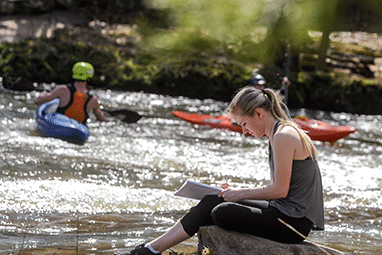SPARTANBURG, S.C. – Wofford College will present a panel of experts on the effects of climate change on infectious diseases at 7 p.m. Tuesday, April 19, in the Olin Teaching Theater as the inaugural lecture of the Milliken Lecture Series on Sustainability and Public Health.
The discussion, titled “From Algae to Zika: Effects of Climate Variability and Change on Infectious Disease,” is free and open to the public. The Olin Teaching Theater is in the Franklin W. Olin Building on Wofford’s campus.
Panelists will be Dr. Andrew Monaghan, a meteorologist and scientist at the National Center for Atmospheric Research in Boulder, Colo.; Dr. Erin Lipp, professor of environmental health science and graduate coordinator at the University of Georgia; and Dr. Gregory T. Valainis, a specialist in infectious disease.
The Milliken Lecture Series on Sustainability and Public Health was created through the Milliken Sustainability Initiative at Wofford College, made possible by a $4.25 million grant from the Romill Foundation, the personal foundation of the late Roger Milliken, a dedicated champion of Wofford and the Upstate. Milliken was the longest-serving trustee on Wofford’s Board of Trustees and was a major benefactor of the college, overseeing the growth and strategic planning for the college as well as its arboretum, named in his honor.
The grant provides that the lecture series be created to present topics such as sustainability and public health to wider audiences that include health care providers and K-12 teachers, “audiences that may not be attracted to attend an event oriented toward traditional stances on sustainability, but would attend events focused on how sustainability encompasses local health and wellness issues.” The program is presented, in part, by the Wofford Environmental Studies Program.
Monaghan is a guest researcher with the U.S. Centers for Disease Control and Prevention and co-leader of the NCAR Weather, Climate and Health Program. His research primarily focuses on the use of model-based techniques to study climate-sensitive health and disease issues. Recent work has examined meteorological linkages with human plague, meningitis, dengue and Zika viruses, Lyme disease and West Nile virus.
Lipp’s research is focused at the intersecting roles of water, climate and environmental change on the microbial ecology of pathogens. She has worked with both national and international agencies on the effects of climate change on human health, with an emphasis on water and foodborne diseases. She was a contributing author on the Health Chapter for the IPCC Working Group II Fifth Assessment Report; and is a contributing author on the 2016 USGCRP Climate & Health Assessment. Lipp was elected as fellow in the American Academy of Microbiology in 2016. She received her Ph.D. in marine science from the University of South Florida and her bachelor’s degree from New College of Florida.
Valainis received his medical degree from the Medical College of Virginia and completed his residency in internal medicine while serving as chief resident at the University of Florida Health Science Center in Jacksonville, Fla. He completed a fellowship in infectious disease at the Alton Ochsner Medical Foundation in New Orleans, La. Valainis is board certified in internal medicine and infectious disease. He is an adjunct clinical professor of internal medicine and infectious disease at Pikeville College School of Osteopathic Medicine; professor of medicine at the Medical University of South Carolina; clinical professor of internal medicine, Division of Infectious Diseases at Philadelphia College of Osteopathic Medicine; and clinical track, associate professor of internal medicine at Edward Via College of Osteopathic Medicine.
Wofford to present panel on effects of climate change on infectious disease
April 19 event inaugural Milliken Lecture on Sustainability and Public Health
A Wofford student journals at the Goodall Environmental Studies Center as part of her environmental studies course.
2016-04-15